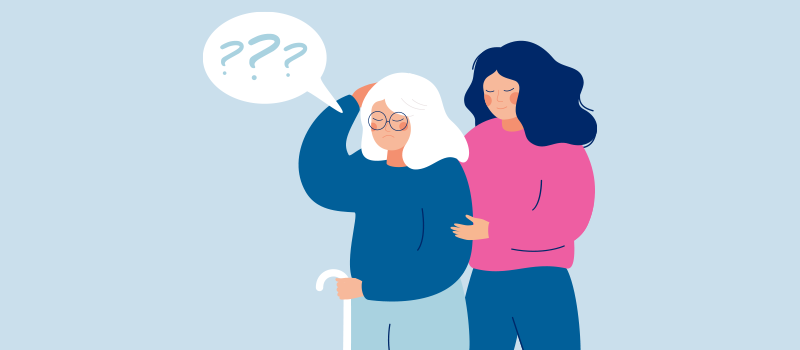What’s the Buzz
The Bee Healthy Blog
Is Dementia a Mental Illness? Similarities and Differences Between the Two

The Centers for Disease Control and Prevention (CDC) estimates that over 5.5 million adults in the US have Alzheimer’s disease, a common type of dementia. By 2060, this number is expected to rise to 14 million. Mental illness is a broad term that includes a wide range of emotional and behavioral disorders. So, is dementia a mental illness? And what are the similarities and differences between them? Please continue reading to find out.
What is dementia?
Dementia is not a single health condition. It is a broad term used to describe a decline in thinking abilities, problem-solving skills, memory loss, poor judgment, and difficulty communicating that occur due to changes in brain cells. Dementia is an irreversible condition that is more likely to affect older individuals and can also affect younger adults. The two main risk factors are age over 65 and a family history of dementia.
Other conditions like vitamin deficiencies, thyroid disorders, and brain tumors can also cause symptoms of dementia, but these symptoms are often reversible.
Alzheimer's disease is the most common form of dementia. Vascular dementia and Lewy bodies dementia are other types. It is possible to have more than one type of dementia simultaneously, and this is called mixed dementia.
The decline in cognitive functions in dementia patients affects their emotions, behavior, relationships, and the ability to function in daily life.
Is dementia a form of mental illness?
Dementia is not a mental illness. However, it can affect a person’s mental health just like a mental illness can.
Mental illness and dementia can be misdiagnosed, especially in elderly patients, because they cause many of the same symptoms. It is important that a mental health condition is properly diagnosed as dementia or mental illness to ensure that a person gets the appropriate treatment.
What are Alzheimer’s disease dementia symptoms?
Signs and symptoms of dementia include problems with short-term memory, communication difficulties, general confusion, emotional changes, and personality changes. These changes can start out as mild and undergo progressive decline over time to severe and moderate stages.
It’s important to seek a consultation with a healthcare professional for any memory difficulties or changes in thinking abilities. This can help to determine the cause of the symptoms and get a proper diagnosis and appropriate treatment. Dementia cases obtain maximum benefit when the condition is diagnosed and treated early.
What are the types of mental illnesses common in the elderly?
The stress of dealing with physical illness, immobility, and social isolation plays a key role in mental illness in seniors. The most common mental disorder in the elderly is depression (extreme sadness feelings). Other common mental illnesses can include irritability, anxiety, post-traumatic stress disorder, obsessive-compulsive disorder, late-onset bipolar disorder with depressive and manic behavior, late-onset schizophrenia with erratic behavior, and paranoia sleep disturbances.
Many of these mental illnesses can cause dementia-like symptoms and behavioral disturbances. Both dementia and mental illnesses can cause the same symptoms such as hopelessness, disinterest, agitation, restlessness, delusions, hallucinations, and more. Such symptoms can make it difficult for family members to figure out whether it is dementia or other mental disorders.
Mental illnesses and neurological disorders are treatable, but making a correct diagnosis is vital. That’s why it’s important to seek care from a mental health professional for any behavioral symptoms as soon as possible.
What is the difference between mental illness and dementia?
As mentioned, mental illness often manifests with symptoms similar to dementia. However, there are some key differences between dementia and mental illness:
- Mental illnesses and psychiatric disorders generally develop in early adulthood, although they can sometimes develop later in life. On the other hand, dementias usually affect middle-aged and older adults.
- Mental illness is frequently recognized and treated earlier compared to dementia because it tends to cause direct distress and places demands on family members and caregivers. In contrast, dementia in the early stages is often ignored and put down to normal age-related changes.
- The majority of patients with dementia experience mood changes and behavioral symptoms. Major depression and anxiety disorders are common in Alzheimer’s disease patients. In contrast, patients with psychiatric or psychotic conditions may not demonstrate dementia symptoms.
- The presence of psychiatric symptoms, particularly depression, in dementia patients is associated with a more severe decline in cognitive function and an increased risk of faster progression to severe dementia.
How does dementia relate to mental health?
People with dementia often experience mood changes that can affect mental health. For example, dementia patients may become irritable, anxious, depressed, tearful, or agitated. Many of these symptoms are common with other mental health conditions. Accurate diagnosis is, therefore, key to ensuring a person gets the correct treatment.
What are some similarities and differences between mental health and mental illness?
Mental health is a term that includes a person’s social, psychological, and emotional well-being. It affects a person’s thoughts, feelings, behaviors, judgment, and ability to handle stress.
Poor mental health and mental illness are not the same things. A person can experience poor mental health without any of the main symptoms of a specific mental illness. Likewise, a person can be diagnosed with a mental illness but experience long periods of good mental health.
Wrapping up
The relationship between mental illness and dementia is a complex one. The symptoms of dementia and mental illness often overlap.
A multidisciplinary team of healthcare professionals, including physicians, mental health professionals, nurse practitioners, physical therapists, social workers, and caregivers, are often required to manage patients with dementia and mental illness.
An individualized treatment plan can help to optimize the quality of life of dementia patients and people with mental illness. Such a plan can help to build a healthy partnership between the patient and their caregivers by educating them about dementia symptoms, psychiatric symptoms, and the interventions necessary for their successful treatment.
References:

SOCIAL